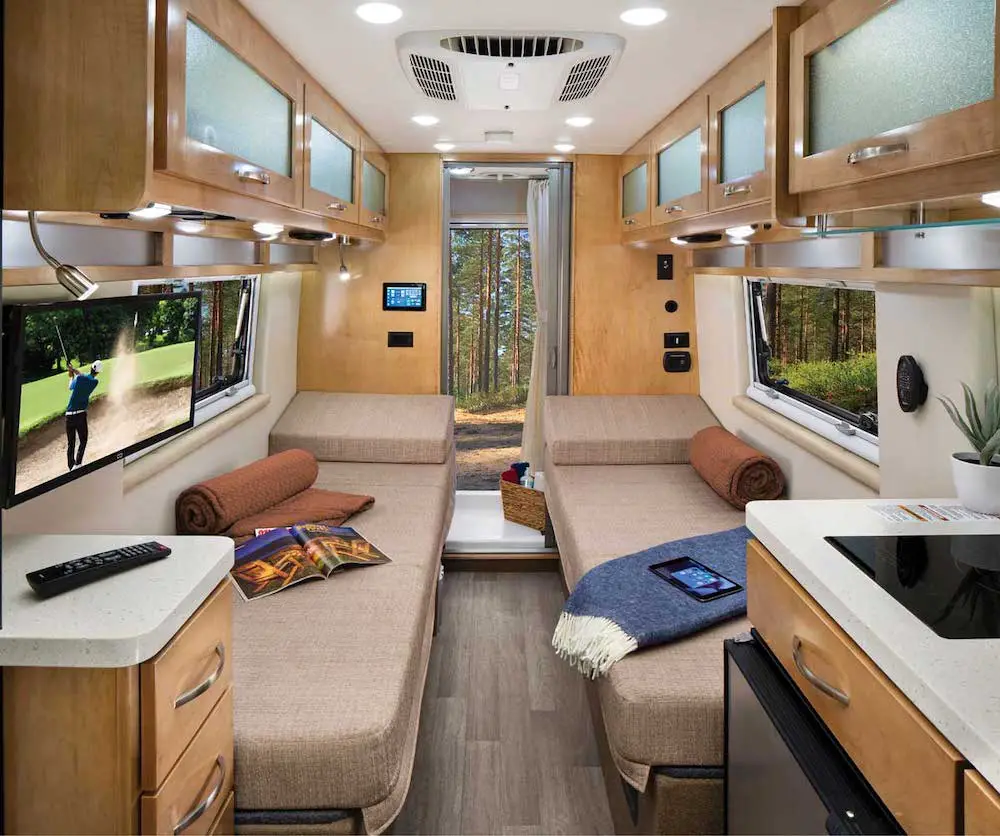If you’re looking for a small RV for camping, the best thing to do is choose one that fits your needs. There are many kinds of RVs that are versatile enough to suit just about any budget. However, many don’t want to drive a massive vehicle or spend a fortune on one, so choosing the right small RV is critical.
Table of Contents
Here are some reasons why people love small RVs so much:
- Maneuverability: Small RVs are easier to maneuver and park than larger RVs. This makes them ideal for navigating through crowded cities or tight campgrounds with narrow roads or campsites.
- Fuel Efficiency: Small RVs tend to be more fuel-efficient than larger ones, which can save you money on gas or diesel fuel. This is especially important if you plan to take long road trips or travel frequently.
- Cost: Small RVs are generally less expensive to purchase than larger ones, making them a great option for those on a budget. Additionally, smaller RVs may be easier to maintain and repair, which can save you money in the long run.
- Flexibility: Small RVs can be used for a variety of purposes, including camping, road trips, tailgating, and more. They are also easier to store and can be parked in smaller spaces, allowing you to use them in more locations.
When looking to purchase a small RV here are some of the things that are important to consider.
1. Consider Your Needs
When choosing a small RV, it’s important to consider your needs. What do you need from your RV? What are your camping goals? Are there any limitations or constraints that will keep you from enjoying the experience of being in an RV for long periods?
It’s also important to know what kind of budget you have available before making a big purchase like this. Do you want a used RV or a new one (and how much)? Are there any additional costs associated with traveling with an animal(s) on board and food and water supplies (and where do they go when they aren’t needed)? Once all these questions have been answered, the fun part comes—deciding what vehicle will best fit those needs!
2. Determine Your Budget
The best way to do this is by looking at the total cost of owning and operating one of these vehicles and any additional expenses that might come up (like insurance).
One thing you’ll want to keep in mind when thinking about how much money you want or can spend on an RV is how flexible it will be for future changes in your life—and what kind of flexibility means for both short-term and long-term planning.
3. Look For Features
You can find features that are important to you by looking at your RV’s specifications. Look for the following:
- How much room do you need? If you’re going to be camping with more people or if they have different sleeping arrangements, this will be a factor in choosing an RV.
- Comfort/safety. Is there enough space inside the unit so everyone can be comfortable? Does it have air conditioning and heating options (if applicable)? Do all of those things work well together, or do they cause problems with each other? These questions should be answered before buying an RV because once it’s yours, there’s no going back!
4. Consider the Season
When you’re looking to buy a small RV, it can be helpful to consider the season. If you live in an area where the weather is unpredictable and unpredictable, then it might not be worth spending more on something that will only get used for a few months out of the year.
However! If you plan on traveling during certain times of year (such as spring and summer), buying a larger RV will help protect yourself from inclement weather conditions. You may also want an RV that can handle winter travel; many models are equipped with heating systems or built-in air conditioners to keep occupants comfortable while moving around the town or camping at an outdoor destination.
5. Take It for A Test Drive
When looking for the best small RV, finding a dealer who will let you test drive the vehicle is important. This can be difficult because dealerships often do not allow customers to drive RVs outside their buildings. However, many dealerships have been known to allow customers access to their inventory and even take them on test drives to provide them with more information about what they have available in terms of size and amenities.
It comes down to your needs. A larger one might be better if you’re looking for an RV that can accommodate multiple people or offer more storage space. In most cases, though, a small RV will do just fine!

